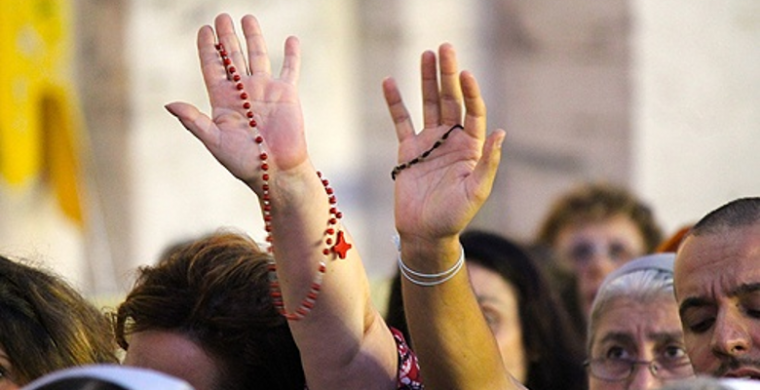VATICAN CITY: A quiet threat: Religious freedom dwindling in Europe, US
By Andrea Gagliarducci
CNA/EWTN News
November 4, 2014
Religious freedom is at risk in Europe and has been increasingly suppressed in the United States over the course of the past year, according to a new report.
The findings were made in the 12th edition of the World Report on Religious Freedom, issued by the pontifical foundation Aid to the Church in Need, released Nov. 4.
The report is a snapshot of the state of religious freedom in 196 countries from Oct. 2012 to June 2014, collecting first-hand data and providing help wherever Christians are needing aid.
Religious freedom in each country was gauged by the right to conversion, to build places of worship, to conduct missions, and the allowance of children to be educated according to the religious principles of their parents.
The Middle East has been a main focus for Aid to the Church in Need, which recently allocated about 5 million Euro to help displaced Christians in Iraq
Peter Sefton-Williams, president of the report's drafting committee, said that the analysis "highlights that the state of religious freedom have worsened in 55 countries" -- that is, 28 percent of the globe.
"Only six out of 196 countries have recorded an improvement," yet four out of these six countries still "record a religious persecution ranked as 'high' or 'medium.'"
"In particular, the situation of Christians has more at risk in the course of the last year. We cannot remain silent in front of this catastrophe, and it is important that our voice is based on trusted and first hand witness," said Johannes Heereman von Zuydtwyck, international executive president of Aid to the Church in Need.
Other data shows that out of 196 countries, 81 nations (41 percent) are identified as places where religious freedom is at risk or declining. Twenty countries are deemed at "high" risk of violation of religious freedom, and 14 out of these 20 are challenged by religious persecutions linked to Islamic extremism.
"The good news, if there is any, is that 80 countries (40 percent of the total) did not record any worry over the lack of religious freedom," Sefton Williams said.
A general overview of the state of religious freedom showed that violations are high in Iraq, Libya, Nigeria, Pakistan, Syria and Sudan.
The United Kingdom, Germany, France, Netherlands and France are among the countries where the state of religious freedom is deemed as "worrying" and at the same time "worsening" by the report.
"Europe has always been considered the cradle of human rights, and it seems to feel the responsibility of defending these rights, at least on theoretical terms," said Martin Kugler, member of the Observatory on the Intolerance and the Discrimination against Christians in Europe.
"On the other hand, it's been proven that fundamental rights have been challenged in European countries."
Kluger said that threats to religious freedom are mainly supported by groups of "radical" feminist and gay lobbies.
"In order to pursue an effective and real equality between men and women, radical feminists think that non-restricting law for abortion, contraception and bio-technologies (for instance, in-vitro fertilization) are needed, and so they push that the objection of conscience" is not relevant anymore, Kluger said.
Gay activists in Europe, Kugler added, "want to show that homosexuality is absolutely normal," and so they push for "a legalization of the gay marriage" and the "possibility for gay couples to adopt children."
Meanwhile, Christians and Muslims are pressured to be "completely silent" for what concerns their moral vision on homosexuality.
Activists, Kugler said, "try to exclude the religious point of view from public life, taking out any public financial aid to religion, and for instance forbidding the exposition or exhibition of a crucifix in public."
He underscored that these forces "try to forbid those who openly claims to be Christian to take public positions."
"Generally these groups of pressures are ready to be intolerant in the name of tolerance, and Christian Churches are their main goals, since they represent, in the secularist view, the highest level of faith in the transcendence and defense of the natural law -- though Christians share this view with other religions," Kugler said.
Scrolling the report, one finds that attacks to Christian places of worships have been continuous in 2012 and 2013.
In Germany, conflicts between state and families reached a high level when the four siblings of Wunderlich family in Darmastadt had been taken away by 20 policemen and a social worker because Dirk and Petra Wunderlich were homeschooling. In 2013 the European Court for Human Rights published its judgment on four British cases on individuals who filed complaints of having been discriminated against because they are Christians.
And in the Middle East, the situation in Iraq is continually worsening.
Pascale Warda, an Iraqi who founded the Iraqi Society for human Rights and formerly Iraqi Minister for Migration Policies, said that one of the main reasons why Christians are fleeing Iraq is "the situation that I would call 'anti-non-Islamic religious freedom' exercised by the Islamic authorities imposed on the administration," despite some positive laws issued in the past.
For what concern the United States, violations to religious freedom are deemed "low," but the general situation is marked as "worsening."
A U.S. report issued by the Institute for Freedom in collaboration with the Council for the Research on Family which documents 1200 cases of hostility to religion which is double the previous year, the Aid to the Church in Need report read.
Among the cases taken in consideration was that of Jack Phillips -- a Christian baker from Colorado, who had refused in 2012 to make a wedding cake for a homosexual marriage because of his religious objections -- in June 2014. A Colorado board ruled that he must make cakes for gay weddings despite his religious objections.
END














